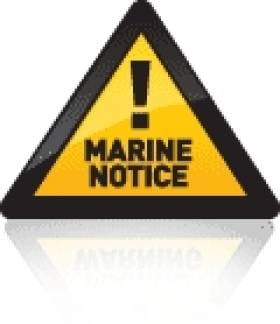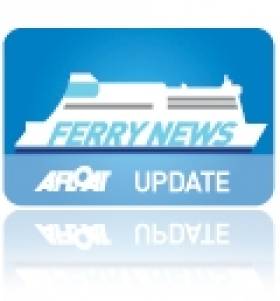Displaying items by tag: passenger ship
Passenger Ship Tendering Requirement Details
#tender – The Department of Transport, Tourism and Sport wishes to advise Shipowners, Ship Operators, Shipmasters, Harbour Masters and Ships' agents of the requirements for passenger ships engaged in the tendering of passengers between the ship and shore.
All tender vessels must comply with the relevant provisions of the Merchant Shipping Acts. There are two main types of tendering as follows:
(a) Passenger Ships using ship's own tender vessels;
(b) Shore based domestic tender.
Considering each as follows:
(a) Ship's Own Tender Vessels – International Cruise Ships
It may be necessary for a ship to use its own tenders in cases where suitable berthing facilities are not available, or where the ship's draft or size prevents it from entering a port. This is permissible under the Merchant Shipping Act 2010 which sets out the requirements to be followed.
Proposals must be in compliance with the provisions of the Merchant Shipping Act 2010 and the IMO Guidelines for Passenger Ship Tenders as contained in IMO circular MSC.1/Circ.1417.
• There must be adequate manning on the bridge to ensure that the tendering operation is continuously monitored.
• Tendering operations are not to be carried out in restricted visibility.
• The ship and its tenders must maintain a continuous listening watch on VHF Channel 16 and the port working channel at all times during the operation.
• The ship must have the approval of the port(s) in which any operations are to take place.
(b) Using Shore Based Tender Vessels – Domestic Passenger Ships/Boats
All such tender vessels must comply with the Merchant Shipping Acts and hold a current valid passenger ship safety certificate or passenger boat licence.
Domestic Passenger ships/boats are to be moored to a single point mooring for the duration of the transfer. Such moorings are to be licensed by Coastal Zone Management (Foreshore Unit, Department of the Environment, Community and Local Government), and must not be located such as to cause obstruction to other vessels. Owners must ensure that such moorings are inspected on an annual basis.
Domestic Tendering operations will normally only be permitted for the summer period comprising of June, July and August and is subject to annual review.
Application Procedure
The owner or master of a ship who proposes to undertake a tendering operation at any place in the State, in respect of that ship, must apply to the Marine Survey Office for a permit to undertake such operation by submitting for approval a "Tendering Operations Safety Plan Proposal" in the format laid out in the Annex to this notice. An application for a permit to tender should be submitted 28 days before the date of the proposed tendering, to allow sufficient time for the proposal to be assessed.
The Marine Survey Office may withdraw a permit to carry out tendering operations where there is a failure to comply with the conditions of the permit.
This Marine Notice supersedes Marine Notice No. 12 of 2013.
Irish Maritime Administration,
Department of Transport, Tourism and Sport,
Leeson Lane, Dublin 2, Ireland.
18/02/2014
Encl.: Annex
Annex to Marine Notice No. 19 of 2014
MARINE SURVEY OFFICE
TENDERING OPERATIONS – SAFETY PLAN PROPOSAL
Operators:
Address:
Proposed tendering location:
Period of tendering proposed:
Description of proposed operation:
Insurance company details:
Nominated company official responsible for tendering operation:
Tendering Craft Details:
Type/names of vessels:
Number of tenders:
Is the tender a SOLAS approved Lifeboat as per MSC.1/circ.1417:
Materials of construction:
Number of crew in tender:
Maximum number of passengers in tender:
Propulsions Means / KW:
Number of lifejackets/buoyancy aids available for passengers:
Luggage transported separate to passengers, yes or no:
Tender Safety Certificate attached (last service inspection for Rib/Zodiac type boats)
Passenger Ship Details:
Name of ship(s):
Offshore mooring facilities available (give GPS co-ordinates):
Expected distance from vessel to shore:
Maximum number of passengers:
Means of berthing tender alongside:
Access means to board passenger vessel (ladder, ramp etc):
Means of embarkation from ashore, e.g. Slipway, steps, pontoon etc
Wind conditions:
Maximum wind conditions for tendering operation as per risk assessment for operation
Wave / Swell Height:
Maximum operational swell height for operation
Alternatives due to suspension of tendering:
Alternative proposals for suspension of tendering operations, i.e. Stranded passengers
Disabled passengers:
Disabled / special needs passengers – tendering operation arrangements:
Lifejackets/PFDs
SOLAS lifeboat type tenders – Where lifejackets are not worn but stowed in tender, has a risk assessment been carried out or is an ISM procedure in place?
Emergency Assistance
What emergency assistance is available for a tender in difficulty?
IMO Guidelines (not applicable to certified domestic passenger ship/boats)
Please confirm that the tender vessel and operation comply with the requirements of IMO circular MSC.1/Circ.1417
Safety Announcements:
Safety announcement to passengers:
1. Prior to boarding tender from pier, yes or no:
2. Prior to disembarking tender, yes or no:
3. Prior to embarking tender from passenger vessel, yes or no:
Operational records:
Method of keeping tendering operation records:
To include details of: dates & times of tendering, no. of trips and passenger numbers carried by each tender, name of passenger vessel embarking/disembarking, prevailing weather & sea state conditions
Proposed tendering dates:
Dates Operational times
1.
1.
2.
2.
3.
3.
4.
4.
5.
5.
6.
6.
7.
7.
Additional actions proposed by operations:
When completed, this form should be returned to:
Marine Survey Office, Department of Transport, Tourism and Sport, Leeson Lane, Dublin 2.
Passenger Ship Obligations to Assist in Search & Rescue
The Department of Transport's latest marine notice pertains to the requirements for passenger vessels in assisting with search and rescue services.
All passenger ships on international routes - such as ferries and cruise liners - are obliged to have a plan for co-operation with search and rescue operations should their assistance be needed.
The notice outlines that any plan should be developed between the ship itself, the ship company and the Irish Coast Guard. Plans must also be drilled periodically to test their effectiveness.
Ship owners and masters are also obliged to give an indication of the existence of their co-operative rescue plans by way of SeaSafeIreland (SSI) notification. Should that not be possible, the Marine Survey Office of the Department of Transport must be notified directly.
A PDF of Marine Notice No 18 of 2011 is available to read and download HERE.

























































